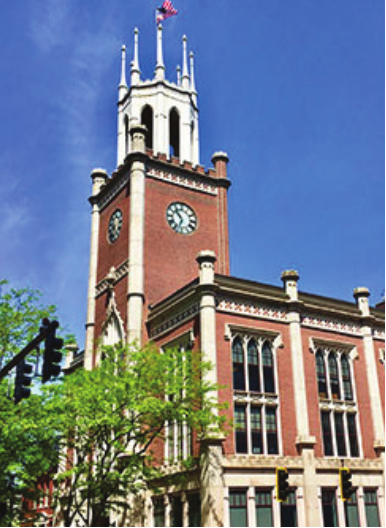Takeaways from new Manchester Mayor Jay Ruais’ first State of the City address

Manchester Mayor Jay Ruais answers a question from moderator Scott Spradling during the Greater Manchester Chamber’s State of the City breakfast on Feb. 14. (Jeffrey Hastings/FOM Media)Whether some call it “Manch-Vegas” or “Manch-ghanistan,” Jay Ruais wants to counter the tongue-in-cheek nicknames his city has acquired with compassionate but decisive action.
“It does a great disservice to our city to use that language,” he said. “I’m not naïve to the challenges that we have, but the more I meet with people, the more firmly I believe that we can get things done.”
The newly elected mayor of Manchester stood before more than a hundred Greater Manchester Chamber members, city officials and other community members to deliver his inaugural State of the City address Wednesday morning, followed by a “fireside chat” discussion with former WMUR reporter Scott Spradling.
Here are the key takeaways from Ruais’ outlook on his term ahead.
Homelessness

The “most pressing issue” Ruais says his administration faces is homelessness, and his team has already begun making moves to attempt to resolve it.
“In our first 43 days in office, we have identified measures or steps we can take quickly,” he said. “We didn’t get into this problem overnight, and we’re not going to get out of it overnight.”
Among the first of these steps is working with the governor’s office to secure $5.23 million in appropriations for the city’s Farnum Center and Waypoint projects aimed at recovery from substance use disorder and youth homelessness. In the meantime, the Ruais team has also added 15 minutes to the Manchester Continuum of Care, a collaborative coming up on its 30th year that seeks to rehouse people and families without homes.
“(Chris Santaniello), the director of housing stability, has positioned our application to be the lead applicant and is building momentum with the COC leadership to set goals and benchmarks on the system improvements,” Ruais said. “The COC will vote next month on moving forward with this process and begin to transition steps.”
Ruais declared that Manchester will ban encampments within city limits contingent on a U.S. Supreme Court ruling slated for this summer on whether unhoused people have the constitutional right to camp on public property. It comes after a decision from the U.S. 9th Circuit Court of Appeals, which held that denying those experiencing homelessness a place to sleep is cruel and unusual punishment. Ruais added that he’s already eyeing an ordinance recently passed in Los Angeles prohibiting encampment “within 500 feet of a sensitive facility, including schools, day care facilities, parks and libraries.”
He said Manchester officials want to help those feeling like they’re trapped in a homeless cycle. That means guiding them to options like transitional housing — like Catholic Charities NH’s Liberty House for homeless veterans — and rapid rehousing to get people “back on their feet as quickly as possible and not … experiencing chronic homelessness.”
“But do not mistake our compassion and empathy for indifference to the law,” Ruais warned.
“Understand that we’re not going to have any patience for lawlessness.”
Housing crunch
That led into Ruais’ attention on Manchester’s gaps in housing, which he said his administration seeks to fill with an initiative to develop city-owned properties into new homes.
“Our tax collector and assessor has identified 14 vacant lots … that we could deem surplus and look to develop for housing,” Ruais said. “By leveraging the opportunities these assets provide, we can make a huge difference on this critical issue.”
The new mayor is also stepping into his two-year term amid the city’s latest rewrite of its zoning ordinance in 20 years, a draft of which Ruais said the Planning and Community Development Department plans to release this spring. Listening tours to solicit community input will follow in the summer, with a vote on the final ordinance by the end of the year.
But he said new housing cannot wait. Thus, Ruais asked the department to put forth a list of recommended changes. Of them is an elimination of planning board review for accessory dwelling unit (ADU) modifications, “making it easier for homeowners to construct various types of ADUs on their properties while preserving their neighborhood character.” ADU structure requirements must still be in place that will be outlined in the ordinance. New amendments, however, will allow a larger minimum lot size of four units versus the current three units, as well as a reduction in parking space requirements.
State grants totaling $1.65 million aimed at creating 102 affordable housing units also hope to bring greater residential volume to the Queen City, the mayor said.
Bringing business
“Manchester is an incredible place to do business.” That’s the feedback Ruais said he received from the owners of the new Dave’s Hot Chicken, which opened its doors on South Willow Street last month as its second location in New Hampshire.
But where there’s hot new business coming in, there’s interest from young professionals in being in the city, or so says Ruais. That takes fulfilling demand for workforce housing, the mayor said, and he estimates Manchester could bring in 7,000 direct jobs and 37,000 indirect jobs in the next years. The city approved a new master plan in 2021 outlining municipal development in the decade ahead.
Though not directly addressed in the master plan, some eyes are on the city’s Manchester-Boston Regional Airport (MHT) and its vitality in the coming years, of which some responsibility Ruais said lies with the people.
“If you’re an airline and you’re trying to make an economic decision about whether or not to come into the city, what’s the first thing you’re going to look at? How many people are flying out of Manchester,” he said.
Pointing to Boston Logan International Airport as MHT’s biggest competitor, the mayor said he feels the city could stand to better promote MHT and its lower-cost pricing options for airfare and parking tickets.
Schools
If more younger professionals are to move into Manchester, Ruais said the city must adequately support its schools for new and growing families.
“A city is going to have ebbs and flows down the line, but if we do not have a good public school system, that is the long-term death knell for the city,” Ruais said to Spradling in his chat.
Highlighting educational successes, Ruais said the school board secured $18 million in grant funding, student attendance has climbed 8% year-over-year, and the district’s dual immersion language program is growing.
The school board on Monday, Feb. 12 sent a $232 million Fiscal Year 2025 budget proposal to Ruais and the city aldermen for consideration. Ruais and the aldermen will hold a joint meeting with the school board on March 4 to discuss the district’s long-term facilities plan passed by outgoing aldermen in December who were replaced by eight new members at the time Ruais took office in January.
Ruais said his administration seeks to fill housing with an initiative to develop city-owned properties into new homes.